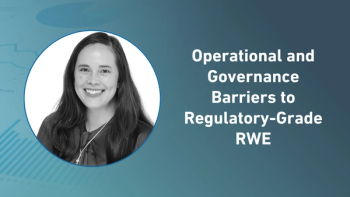
- Applied Clinical Trials-06-01-2023
- Volume 32
- Issue 6
An eCOA Lexicon: The Quest for Single, Trusted Source of Terminology
Since electronic data collection started to gain traction in the 1990s, terminology has evolved and is in need of greater clarity.
While the earliest attempts to collect data directly from patients via portable electronic devices within academic and private research were described in the 1990s, the concept of electronic patient-reported outcomes (ePRO) didn’t gain traction until the new millennium. This was principally due to a general resistance across the pharmaceutical industry to evolve from established paper-based data collection practices, as well as uncertainty about the reliability of ePRO systems and the assumed risks. Today, due primarily to the wide availability of powerful, relatively inexpensive technology, and the expanding evidence base detailing the benefits of eCOA over paper-based data collection, eCOA has become the preferred and recommended approach.
Over the course of this long evolution, eCOA-related terminology has been developed, adopted, re-purposed, misused, and misunderstood. Without a common lexicon among those involved in the eCOA space (e.g., eCOA providers, sponsors, study site staff, measure authors, translation providers, and regulators), the chance for miscommunication, error, and inefficiencies increases. Given the importance of efficiency and standardization in the drug development process, it is of universal benefit to find ways to minimize confusion and facilitate communication across all aspects of technology-supported clinical research.
Critical Path Institute instigated the eCOA: Getting Better Together Initiative (GBTI) in 2019. GBTI is a collaborative, pre-competitive initiative among C-Path, eCOA technology, and allied service providers from the eCOA Consortium, clinical trial sponsors from the PRO Consortium, and with consultative input from FDA. The initiative aims to identify and address the root cause of issues with eCOA implementation in clinical trials and drive positive and lasting change for the benefit of all stakeholders. As part of eCOA: GBTI, C-Path convened an eCOA Lexicon Project Team charged with reviewing terminology and create an aligned lexicon for use by stakeholders across the eCOA ecosystem.
The GBTI eCOA Lexicon working group first convened in 2020 and generated a list of eCOA-related terminology based on the group’s initial assessment of terms that were most common and relevant to the fundamentals of eCOA data collection. The group applied a definition to each term using well-accepted industry definitions of eCOA-related terminology from existing industry sources, such as the FDA/NIH BEST glossary or various other regulatory documentation. Where industry-specific sources did not exist, general web resources were referenced. If no existing definition existed or was unclear, the working group developed and refined new definitions based on the consensus of project contributors. The group defined generic terms from an eCOA-specific framing. Version 1 of the Lexicon was completed and posted to the C-Path website in February 2021.
Version 2 of the eCOA Lexicon built upon the first and added new terms, again referencing any pre-existing and relevant definitions from industry sources, as well as consensus definitions from the same reviewers mentioned. The most current version (Version 3) was recently
While a seemingly straightforward task, ensuring definitions were specific to the eCOA setting, while also reaching broad consensus of wording, proved a stimulating challenge for the working group. For example, the term “engagement” combined an existing WHO definition with refinements from the Lexicon working group to develop a definition that specifically referenced “elements within an eCOA application that facilitate and support participants’ active involvement throughout their clinical trial experience.”
Ensuring we’re using terms consistently is vital to making meaningful progress in clinical research, and the eCOA Lexicon joins other notable efforts to this end. This is an initiative with no predefined endpoint. As new technologies and methodologies arise, and the industry consensus on how to talk about electronic data capture in trials evolves, the GBTI eCOA Lexicon working group will continue to update the Lexicon to be a single, consensus source of clear definitions to facilitate stakeholders’ conversations about this fast-moving field.
Authored on behalf of Critical Path Institute’s eCOA Consortium by Celeste A. Elash, Vice President, eCOA Science, YPrime, and Paul O’Donohoe, Senior Director, eCOA Product and Science, Medidata Solutions.
Articles in this issue
over 2 years ago
Perspective and Hope From the ‘Other Side’over 2 years ago
Changing Behavior: Knowing Doesn’t Equal Doingover 2 years ago
Obtaining Informed Consent for Future Reuse of Patient Dataover 2 years ago
Optimizing the Process for Adopting DCT Solutionsover 2 years ago
Patient Data Return: Do the Benefits Outweigh the Barriers?over 2 years ago
Patient Experience Data: Get Your Copy at DIAover 2 years ago
From 'Brave Spaces' to Battling Bias in Patient Engagementover 2 years ago
Industry Trends: Cycle Time to Resolve Risk Signalsover 2 years ago
A Business Case to Bridge Trials and Careover 2 years ago
ASCO, Clinical Trials for LifeNewsletter
Stay current in clinical research with Applied Clinical Trials, providing expert insights, regulatory updates, and practical strategies for successful clinical trial design and execution.




